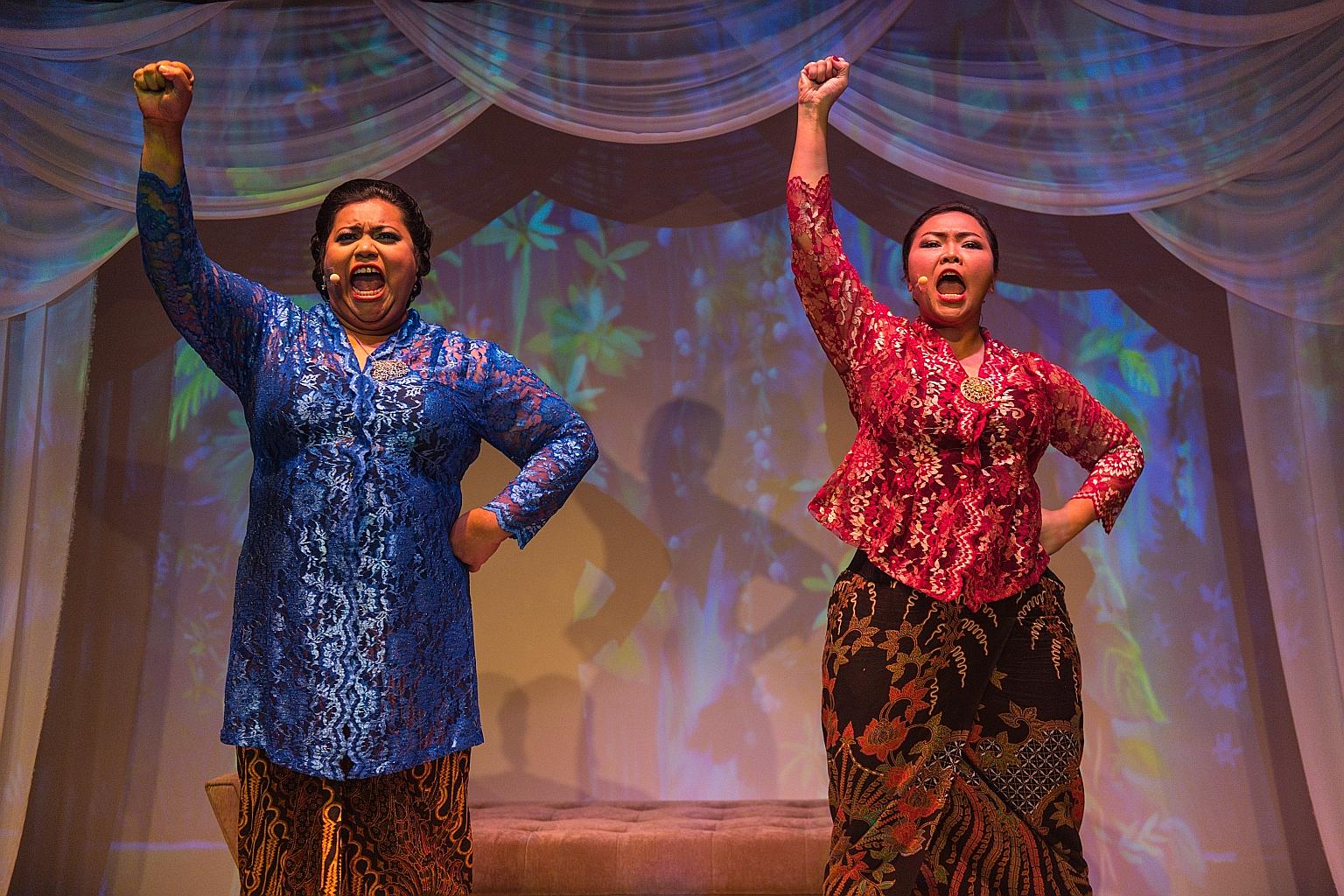Kebaya Homies: Fun cabaret tackles serious issues
Kebaya Homies is a whistlestop tour through some of playwright Haresh Sharma's most biting and insightful works
Sign up now: Get ST's newsletters delivered to your inbox

Aidli Mosbit (left) and Siti Khalijah Zainal (right) play multiple roles with ease and charm in Kebaya Homies.
PHOTO: THE NECESSARY STAGE
KEBAYA HOMIES
The Necessary Stage Esplanade Annexe Studio/ WednesdaySenior
Fashion, so often dismissed as vanity and fluff, can be a powerful political statement.
This is clear from the moment Aidli Mosbit and Siti Khalijah Zainal step on stage fully cloaked in black abaya and niqab.
Without a line of dialogue, the costumes create an instant conversation with the title's reference to the kebaya, a style of dress popular with the Malay community and once the height of fashion during the heyday of Malay films in the 1950s and 1960s.
The scene setting - the Annexe Studio is dressed up as a cabaret lounge with audience members seated on chairs around tiny tables, a live DJ spinning vinyls at a console and a bartender serving mocktails and soft drinks - creates more unspoken contradictions before the performance even begins.
Once Aidli and Siti Khalijah get started, Kebaya Homies becomes a rollicking whistlestop tour through some of playwright Haresh Sharma's most biting and insightful works about the Malay community's evolution and struggles.
Scenes from Rosnah and Gemuk Girls are stitched together with the conceit of a pair of cabaret joget girls as the central narrative thread. This works surprisingly well.
The skit format, interspersed with an enchanting playlist of classic Malay tunes and contemporary pop hits, is elastic enough to accommodate the scenarios which rocket from mythic Malay folktales to 1960s Singapore to a parallel reality where Singapore is still part of Malaysia to an imagined retirement home for the theatre community in a climate-challenged future.
While this plot sounds a tad schizophrenic, the show is held together by Aidli and Siti Khalijah, both accomplished, charismatic performers who instantly establish a convivial vibe of sisters sharing confidences with the audience.
Their warmth and charm is invaluable in drawing the audiences into an investigation of Singapore Malay wokeness.
As joget girls Zubaidah and Rukiah, they argue, comically and seriously, about everything from the kebaya versus the hijab to the plight of a modern Malay woman subject to syariah laws about divorce to the Arabicisation of Malay culture.
These bite-sized scenarios about thorny issues are smuggled in under the cover of frivolity, literally with a song-and-dance routine.
The script's multiple characters demand that Aidli and Siti Khalijah switch personae at the drop of a hat, that they go from flirty to forlorn, maidenly to manly, all of which they manage with pinpoint accuracy. It is a pleasure to watch them in action.
The bonus of the evening was the Dancing Daddies, an ensemble of five dignified older gentlemen who burned up the floor in the finale number with their nimble joget moves.
More than simply a hilarious cabaret show, this production is a marvel of workshopped inventiveness which pieces a new quilt from old patches.
It offers a distinctively Singaporean Malay point of view about religion, gender and culture. For this reason, it deserves to be seen by more Singaporeans and the wider world.
• The performance is sold out.


